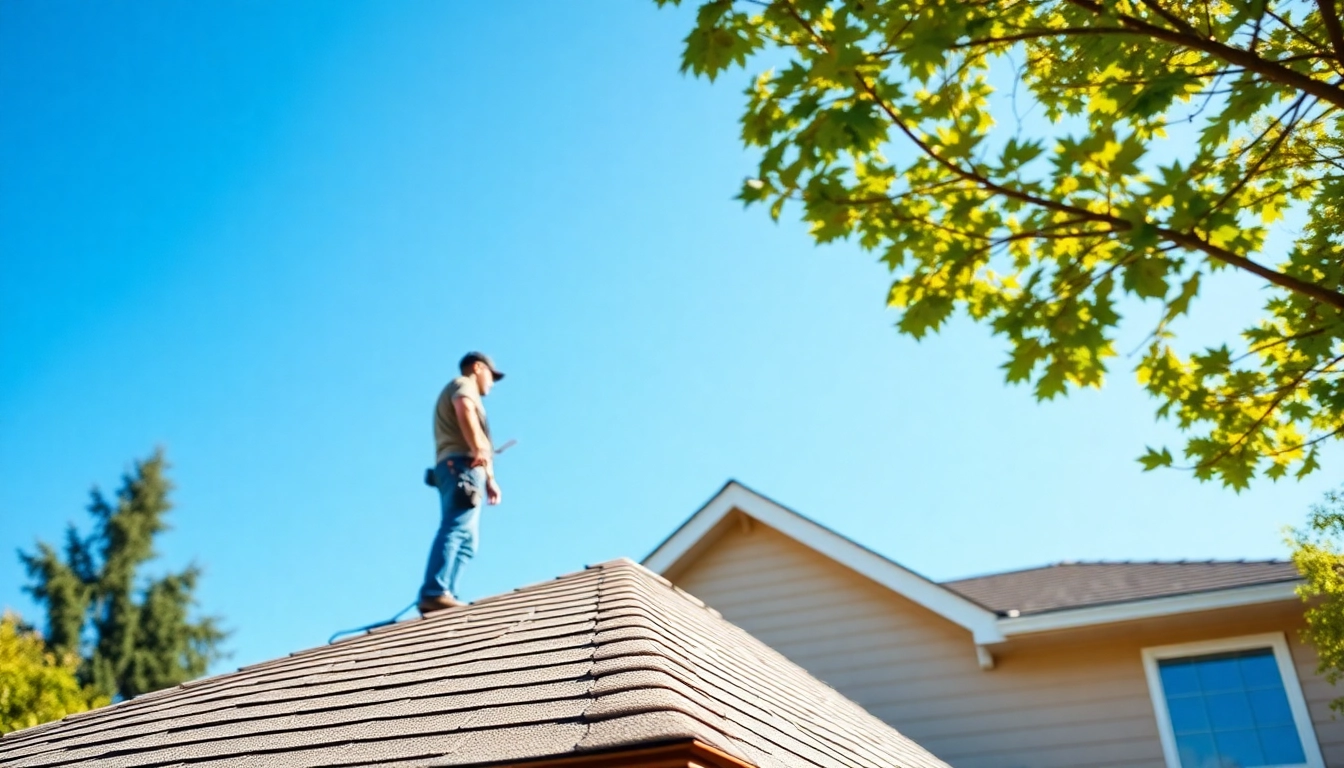Understanding Roof Repair Vancouver Wa
The importance of a well-functioning roof cannot be overstated, particularly in regions like Vancouver, WA, where weather conditions can vary dramatically throughout the year. Homeowners often face various challenges when it comes to maintaining their roofs, making it essential to understand common roof issues, signs that indicate repair, and the significance of regular maintenance. This guide examines these aspects while providing insights into the best practices for roof repairs in the Vancouver area. For specialized help, consider local services for Roof repair Vancouver Wa.
Common Roof Problems Homeowners Face
As homeowners in Vancouver navigate the challenges of roof maintenance, several common problems frequently arise. Some of these issues include:
- Leakage: A leaking roof can cause extensive damage to both the interior and exterior of a home. Common causes include broken shingles, damaged flashing, or clogged gutters.
- Blistering: Blisters can form on the surface of roofing materials due to trapped moisture, leading to premature aging and deterioration.
- Missing or Damaged Shingles: Harsh weather can dislodge or break shingles, leaving exposed areas vulnerable to leaks and water damage.
- Improper Ventilation: Insufficient ventilation can lead to heat build-up and moisture accumulation, which can damage roofing materials and reduce energy efficiency.
- Granule Loss: Asphalt shingles may begin to lose granules over time, which can impact their effectiveness in protecting against UV rays and water infiltration.
Signs Indicating It’s Time for Roof Repair Vancouver Wa
Identifying the right moment to undertake roof repairs can save homeowners significant headaches and costs. Look for these indicators:
- Water Stains: Yellow or brown stains on ceilings or walls may indicate that water is leaking through your roof.
- Visible Aging: A roof showing signs of wear, such as curled or missing shingles, suggests that it may be time for repairs.
- Moss Growth: The presence of moss or mold indicates moisture retention, which can lead to damage if left untreated.
- Drafts or Uncomfortable Temperatures: Fluctuating indoor temperatures can signal lacking insulation or ventilation, making roof maintenance crucial.
- Increased Energy Bills: A sudden rise in energy costs may indicate that your roof is not performing efficiently, calling for immediate attention.
The Importance of Regular Maintenance
Regular roof maintenance is essential for prolonging the life of your roof and maintaining the structural integrity of your home. Benefits include:
- Prevention of Major Damage: Routine inspections can catch minor issues before they escalate into costly repairs.
- Enhanced Lifespan: Proper maintenance can extend the life of roofing materials, delaying the need for a full replacement.
- Improved Energy Efficiency: A well-maintained roof helps regulate indoor temperatures, potentially reducing energy costs.
- Safety Assurance: Regular inspections ensure attic ventilation and proper drainage, mitigating risks of structural damage over time.
Choosing the Right Roof Repair Service
When facing roof repairs, selecting the right contractor is crucial for achieving quality results. Here are important factors to consider:
What to Look For in a Contractor
Start by searching for contractors with established reputations, which often involve:
- Experience and Credentials: Choose a contractor with extensive experience and proper licensing to ensure quality workmanship.
- Insurance and Warranties: Verify that the contractor has liability insurance to protect against accidents or damage during the project, along with warranties on repairs.
- Specialization: Selecting a contractor who specializes in the type of roof material you have can enhance repair effectiveness.
Questions to Ask Before Hiring
Prior to making your decision, consider asking potential contractors these crucial questions:
- Can you provide references or examples of previous work?
- What types of materials do you recommend for my roof?
- What is your estimated timeline for the repair project?
- How will you address unexpected issues during repairs?
- Do you offer a written estimate and contract detailing the work scope?
Evaluating Customer Reviews and Testimonials
Researching customer experiences with specific contractors can provide insights into their reliability. Pay attention to:
- Consistency: Look for patterns in feedback, rather than focusing on individual reviews.
- Response to Complaints: Consider how contractors address negative reviews to gauge their customer service.
- Third-Party Platforms: Check various platforms for reviews to obtain a comprehensive view of a contractor’s reputation.
Preparing for Roof Repair in Vancouver WA
Proper preparation can make roof repair projects significantly smoother. Here are essential steps to consider:
What Steps to Take Before the Repair
Before the repair process begins:
- Clear the Area: Remove outdoor furniture, plants, and debris from around the house to ensure a safe working environment.
- Protect Interiors: Move valuables indoors and cover furniture to protect from dust or debris during the repair.
- Communicate with your Contractor: Ensure clear communication regarding the repair timeline and any access needed they may require.
Understanding the Costs Involved
Costs can vary widely based on material, labor, and additional factors. Consider the following:
- Material Types: Different materials come with various price tags; consider both short- and long-term costs.
- Extent of Damage: Repairs may prove more expensive based on the severity of the damage discovered.
- Labor Charges: Understanding local labor rates and contractor experience can help in estimating repair costs.
How Weather Conditions Affect Repair Timing
Weather conditions play a vital role in determining the optimal timing for roof repairs. Considerations include:
- Rain and Moisture: Repair work is usually postponed during heavy rain to prevent injury and ensure quality.
- Temperature Extremes: High heat can impact the effectiveness of certain roofing materials, while cold temperatures may hinder the curing processes.
- Wind Conditions: Strong winds can pose significant safety risks for roofing crews.
Post-Repair Insights for Homeowners
After roof repairs are completed, homeowners must adapt their maintenance routine to ensure the longevity of their repairs. Here are some key insights:
How to Maintain Your Newly Repaired Roof
To maximize the life of your repaired roof, focus on these maintenance tasks:
- Perform Regular Inspections: A seasonal look at your roof can help reveal any new wear or damage.
- Keep Gutters Clean: Clogged gutters can lead to water backup, which can damage the roof and trim.
- Trim Overhanging Branches: Trees that come into contact with your roof can cause abrasions and allow pests to enter.
Signs of Future Issues to Watch For
Be on the lookout for the following signs that may indicate the need for further repairs:
- New Fresh Leaks: Regularly check for leaks during heavy rain or after significant weather events.
- Mould Growth: Increased mold growth may signify moisture retention issues in your roof.
- Sound Changes: Uncommon noises from the roof structure may indicate loose materials or structural concerns.
Long-Term Benefits of Professional Roof Repair
Investing in professional roof repair yields numerous long-term advantages, including:
- Peace of Mind: Knowing that a professional has performed the work can provide reassurance about the quality and durability of repairs.
- Increased Property Value: A well-maintained roof can enhance the overall marketability and resale value of your home.
- Energy Efficiency: Proper repairs can improve insulation and ventilation, lowering energy costs moving forward.
Local Regulations and Considerations
Understanding the local roofing regulations and requirements is crucial for homeowners planning repairs. This section provides vital considerations in Vancouver, WA:
Permits Required for Roof Repairs in Vancouver WA
Before beginning any roof repair project, homeowners must typically check whether a permit is necessary. Key points include:
- Local Codes: Different areas may have specific code requirements that affect repair types and materials.
- Inspection Requirements: Certain repairs might necessitate an inspection to ensure compliance with safety regulations.
- Consult Local Authorities: Contacting local building officials before beginning work can help streamline the process.
Understanding Local Building Codes
Familiarizing yourself with Vancouver’s building codes can help avoid complications. Key factors to consider include:
- Material Standards: Different materials may be regulated based on safety and performance standards.
- Design Regulations: Roof designs may need to align with aesthetic or functional codes, especially in historic districts.
Community Resources for Homeowners
Homeowners in the Vancouver area can leverage various community resources, including:
- Local Building Departments: These can provide essential information regarding permits and regulations.
- Community Workshops: Many local organizations offer workshops focused on home maintenance best practices.
- Homeowner Associations: These may provide guidelines specific to your neighborhood regarding roofing materials and styles.



